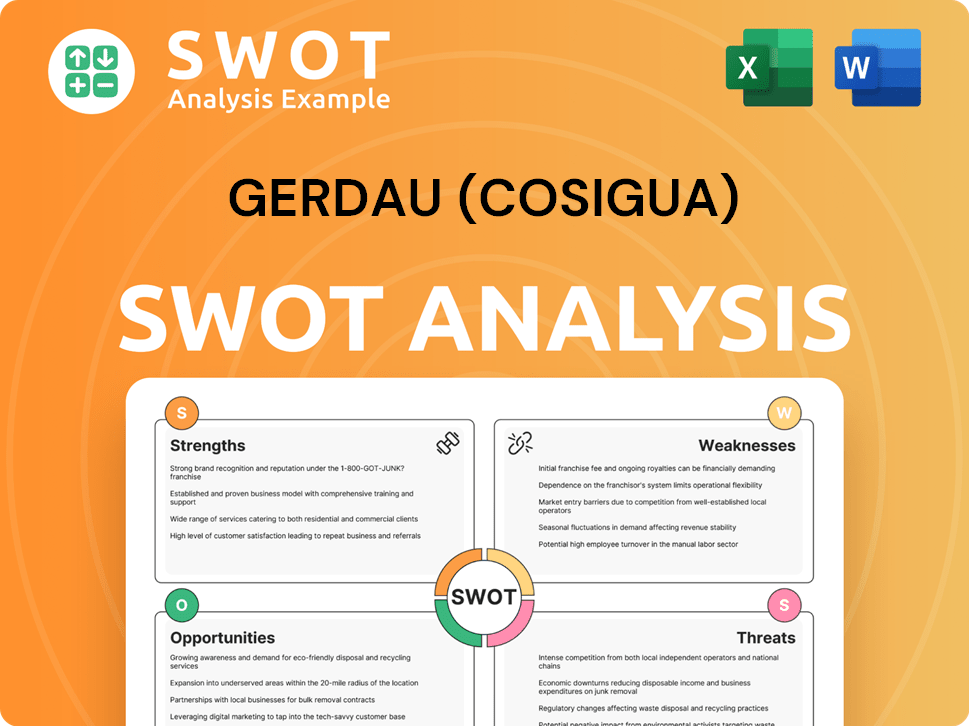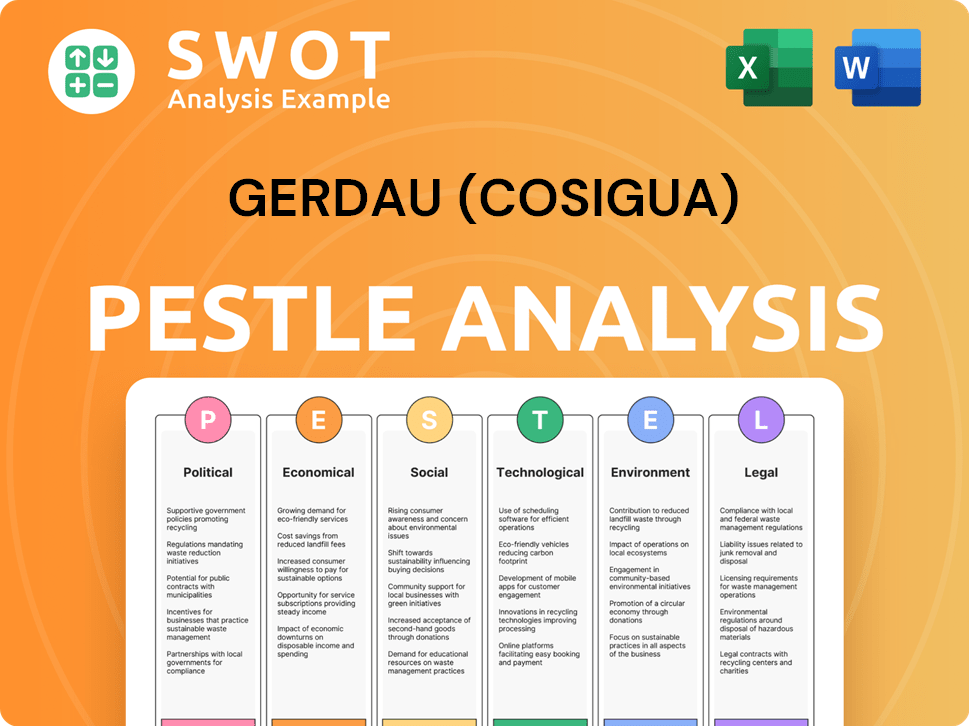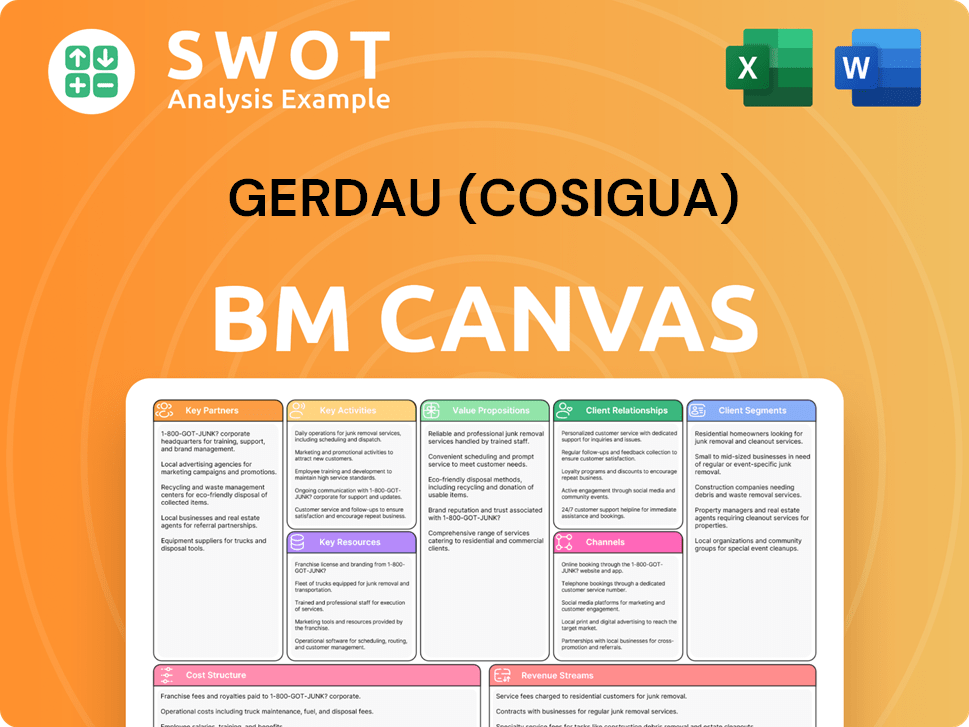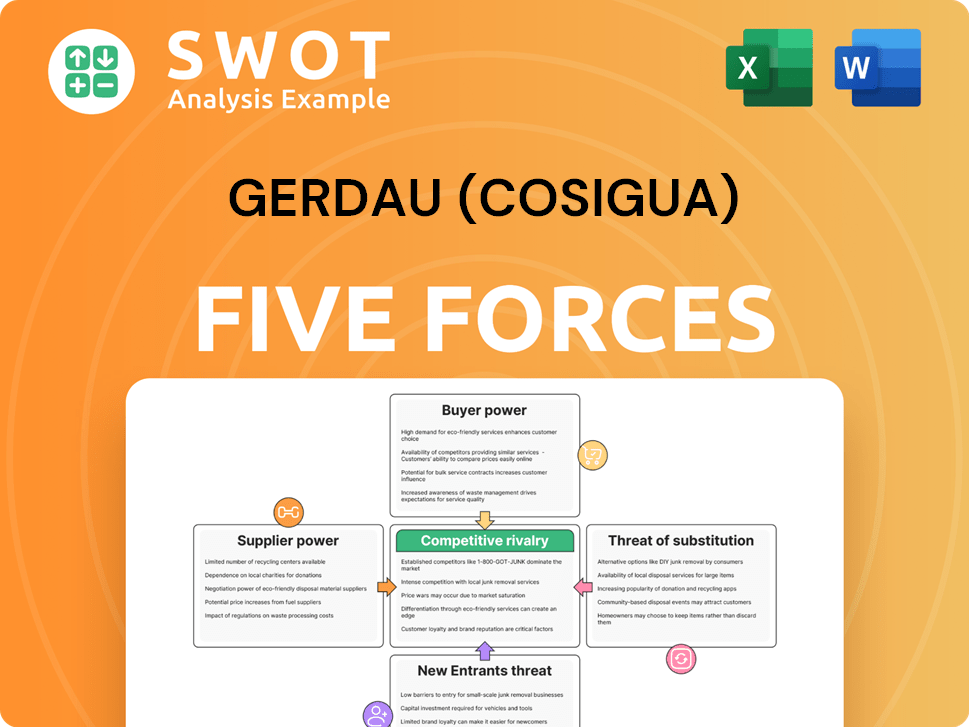Gerdau (Cosigua) Bundle
Decoding Gerdau (Cosigua): Who Are Its Customers?
In the dynamic world of steel, understanding the customer demographics Gerdau serves is crucial for investors and strategists alike. Gerdau, a global steel giant, has evolved dramatically since its inception, making its current target market Gerdau Cosigua a complex and fascinating subject. This analysis dives deep into Gerdau's customer profile, exploring the evolution from local nail factory to a multinational steel producer.

From its humble beginnings, Gerdau's journey showcases the importance of adapting to shifting market demands and customer needs. To gain a competitive edge, it's essential to analyze Gerdau Cosigua customer segmentation by industry and geographical reach. A comprehensive understanding of Gerdau's customer base is vital for anyone seeking to assess its market position and future growth potential, which you can further explore with a Gerdau (Cosigua) SWOT Analysis.
Who Are Gerdau (Cosigua)’s Main Customers?
Understanding the customer demographics and target market of Gerdau Cosigua is crucial for grasping its business model. Gerdau operates primarily in a Business-to-Business (B2B) environment, focusing on supplying steel products to various industries. Its customer base is diverse, spanning sectors that rely heavily on steel for their operations and manufacturing processes.
The company's target market is segmented by industry, with construction, manufacturing, and agriculture being the primary sectors served. These industries utilize Gerdau's steel products in a variety of applications, from construction materials to machinery components. Gerdau's strategic focus on these key segments reflects its commitment to meeting the evolving demands of these industries, particularly in a dynamic global economic landscape.
Gerdau's strategic investments, with a planned CAPEX of R$6 billion in 2025, are aimed at enhancing competitiveness and expanding its presence in long, flat, and special steel across the Americas. This indicates a continued focus on these core B2B segments, with an emphasis on high-value-added products and operational efficiency to meet evolving industry demands. To learn more about the company's ownership structure, you can read about the Owners & Shareholders of Gerdau (Cosigua).
Gerdau supplies essential steel products like rebars, merchant bars, nails, and meshes to the construction sector. This sector's performance is closely tied to economic conditions and government infrastructure spending. In Brazil, residential building launches increased by 35% in 2024, with sales up by 18% compared to 2023.
Steel products from Gerdau are crucial for machinery, agricultural equipment, tools, and other industrial goods. The manufacturing sector's demand is influenced by global economic trends and industrial production levels. While the sector showed stability in Brazil in 2024, some steel-intensive segments faced challenges.
Gerdau provides wires and posts used in agricultural installations and reforestation projects. The agricultural sector's demand for steel is linked to farming practices and rural development initiatives. This sector's growth can be affected by factors like weather patterns and government support.
In North America, Gerdau caters to customers requiring special sections, including elevator guide rails and super light beams. This segment focuses on higher-value-added products, indicating a strategic move towards specialized steel solutions. This diversification helps to mitigate risks.
Gerdau's customer profile is shaped by its B2B model, focusing on industries that require steel products. The company's strategic investments in 2025, with a planned CAPEX of R$6 billion, are aimed at enhancing competitiveness and expanding its presence in long, flat, and special steel across the Americas.
- Construction: Driven by residential building and infrastructure projects.
- Manufacturing: Dependent on industrial production and global demand.
- Agriculture: Influenced by farming practices and rural development.
- Specialized Markets: Focused on high-value-added products and specific applications.
Gerdau (Cosigua) SWOT Analysis
- Complete SWOT Breakdown
- Fully Customizable
- Editable in Excel & Word
- Professional Formatting
- Investor-Ready Format

What Do Gerdau (Cosigua)’s Customers Want?
Understanding the customer needs and preferences is crucial for the success of any business, and for Gerdau (Cosigua), this involves a deep dive into the requirements of its B2B clientele. The company's approach goes beyond simply providing steel products; it focuses on delivering comprehensive solutions that meet the specific demands of various industries. This customer-centric strategy is essential for maintaining a competitive edge and fostering long-term relationships.
The primary drivers for Gerdau's customers include product quality, reliability, competitive pricing, and timely delivery. These factors are particularly important in sectors like construction and manufacturing, where project success often hinges on the consistent performance of the steel products used. In addition, Gerdau addresses common pain points such as fluctuating raw material costs and import competition through operational efficiency and cost reduction initiatives. In 2024, Gerdau achieved cost savings of R$1.5 billion.
Gerdau's commitment to sustainability also plays a significant role in meeting customer preferences. With the increasing emphasis on environmental responsibility, the fact that Gerdau is the largest recycler of ferrous scrap in Latin America, with 71% of its steel produced from recycled materials, is a major selling point. This focus on sustainability aligns with the growing demand for environmentally friendly products and practices within the target market.
Customers prioritize consistent quality and reliability in Gerdau's steel products. This is particularly critical in construction and manufacturing, where product failure can lead to significant project delays and cost overruns.
Competitive pricing is a key factor in purchasing decisions. Gerdau focuses on operational efficiency and cost reduction to offer attractive prices while maintaining profitability. This is a crucial aspect of the Competitors Landscape of Gerdau (Cosigua).
Meeting project timelines is essential. Gerdau ensures timely delivery to minimize disruptions for its customers, especially in time-sensitive construction projects. This is critical for maintaining customer satisfaction and building trust.
Gerdau provides steel products that meet diverse project specifications. This includes specialized steel for manufacturing and tailored solutions for construction projects, ensuring that customers receive the right products for their needs.
Customers increasingly value sustainability. Gerdau's use of recycled materials in steel production, with 71% of its steel from recycled sources, appeals to environmentally conscious customers. This is a growing preference in the market.
Gerdau offers services like Gerdau Design to provide tailored construction solutions. This approach enhances customer productivity and satisfaction by offering comprehensive support throughout the project lifecycle.
Gerdau employs several strategies to meet and exceed customer expectations. These initiatives are designed to enhance customer satisfaction and ensure long-term relationships.
- Gerdau Design: Provides exclusive consulting to evaluate the best construction solutions, offering a complete construction portfolio and improving customer productivity.
- Diversified Contracts: Offers a range of contracts with various term modalities and indices for natural gas supply, enhancing customer adaptability.
- Gerdau Next: A new business division focusing on solutions in construction, sustainability, mobility, and digital sales, demonstrating efforts to meet evolving customer needs.
- Cost Reduction: Achieved R$1.5 billion in cost savings in 2024, helping to maintain competitive pricing and profitability.
- Sustainability Focus: Largest recycler of ferrous scrap in Latin America, with 71% of steel produced from recycled materials, appealing to customers with environmental considerations.
Gerdau (Cosigua) PESTLE Analysis
- Covers All 6 PESTLE Categories
- No Research Needed – Save Hours of Work
- Built by Experts, Trusted by Consultants
- Instant Download, Ready to Use
- 100% Editable, Fully Customizable

Where does Gerdau (Cosigua) operate?
Gerdau's geographical market presence is predominantly in the Americas, with a strong focus on Brazil and the United States. The company also has operations in other South American countries like Argentina, Uruguay, and Peru. This strategic positioning allows Gerdau to tap into growing market needs, especially those driven by infrastructure projects in emerging economies. The company's customer base is diverse, spanning various industries across these regions.
In 2023, Gerdau's net sales distribution highlights its geographical strength: Brazil accounted for 37.4%, South America 10.4%, North America 51%, and Europe and Asia 1.2%. This data underscores North America as its primary revenue generator. The company's ability to adapt to local market conditions is crucial for its success. Gerdau's approach to its Marketing Strategy of Gerdau (Cosigua) involves tailoring its offerings and strategies to succeed in diverse markets.
Gerdau's presence in key markets like Brazil and North America is supported by its strategic investments and operational efficiencies. The company leverages its proximity to raw materials and consumer markets in Brazil to reduce costs and enhance customer service. Gerdau's logistics network, including its stake in MRS Logística and access to ports, further supports its distribution capabilities.
In North America, Gerdau's demand and profitability are supported by infrastructure projects and a more stable competitive environment. The special steel segment in the U.S. is expected to benefit from the recovery in automotive production and investments in renewable energy. Gerdau Ameristeel, the U.S. subsidiary, is the second-largest long steel producer in North America.
The Brazilian market faces challenges, including rising inflation, high interest rates, and increased steel imports, which reached nearly 6 million tonnes in 2024, a record high. Despite these hurdles, Gerdau continues to invest in Brazil, with a new hot-rolled coil mill expansion at Ouro Branco, Minas Gerais, adding 250,000 tonnes capacity for higher value-added steel production in Q1 2025.
Gerdau's strategic global capital expenditure (CAPEX) of R$12 billion for 2021-2026, with R$5 billion allocated for Minas Gerais, underscores its commitment to its Brazilian operations. This investment is designed to enhance production capabilities and meet the demands of its target market.
Gerdau's customer base is segmented across various industries, including construction, automotive, and infrastructure. Understanding the specific needs of each segment allows Gerdau to tailor its products and services effectively. This customer segmentation helps in optimizing Gerdau's market share by customer type.
Gerdau (Cosigua) Business Model Canvas
- Complete 9-Block Business Model Canvas
- Effortlessly Communicate Your Business Strategy
- Investor-Ready BMC Format
- 100% Editable and Customizable
- Clear and Structured Layout

How Does Gerdau (Cosigua) Win & Keep Customers?
The company employs a multi-pronged approach to attract and retain its business-to-business (B2B) customers. This strategy emphasizes long-term relationships, digital transformation, and strategic investments. A key element involves maintaining strong customer relationships, focusing on understanding client needs through proximity and flexible agreements. The goal is to ensure customer satisfaction and loyalty within its target market.
Digital transformation is also a key strategy. The company is digitizing its customer service center with multichannel service options, including WhatsApp, its website, and email. This allows for more personalized service, which helps to improve customer experience and retention. The company's focus on digital solutions is designed to meet the evolving needs of its customer base.
Customer retention is further strengthened through loyalty programs and value-added services. The company's loyalty program, LMC, has a significant reach, with 90,000 registered stores. Over R$7.4 billion in transactions have been made via its virtual store, demonstrating strong customer engagement. The company offers exclusive consulting services, such as Gerdau Design, which analyzed over 120 projects in 2023 to help customers improve productivity and select optimal construction solutions. This is a key part of the company's customer relationship management.
The company prioritizes strong customer relationships as a core strategy. This is achieved by understanding client demands and offering flexible agreements. This approach ensures customer satisfaction and fosters long-term partnerships, which is critical for business success.
Digitalization of the customer service center is underway, providing multichannel support. This includes options like WhatsApp, website, and email for more personalized service. This enhances the customer experience and supports retention efforts in a competitive market.
The loyalty program, LMC, has a wide reach with 90,000 registered stores. The program has seen over R$7.4 billion in transactions through its virtual store. This demonstrates strong customer engagement and contributes to customer retention.
The company provides exclusive consulting services, such as Gerdau Design. In 2023, over 120 projects were analyzed to help customers improve productivity. This service enhances customer value and supports customer success.
In terms of acquisition, strategic investments play a significant role. The company plans to invest R$6 billion in 2025 for maintenance and competitiveness projects. This includes expanding capacity, such as the new hot-rolled coil mill in Ouro Branco, Minas Gerais, which will add 250,000 tonnes of capacity for higher value-added steel. This expansion can attract new customers seeking specialized products. The company also explores new business divisions, such as Gerdau Next, which aims to provide solutions in construction, sustainability, mobility, and digital sales, thereby expanding its market reach and customer base. To learn more about the overall business model, consider reading Revenue Streams & Business Model of Gerdau (Cosigua).
The company plans to invest R$6 billion in 2025 for maintenance and competitiveness projects. This includes capacity expansion, such as the new hot-rolled coil mill.
The new hot-rolled coil mill in Ouro Branco, Minas Gerais, will add 250,000 tonnes of capacity. This expansion allows the company to attract new customers seeking specialized products.
The company explores new business divisions like Gerdau Next. Gerdau Next aims to provide solutions in construction, sustainability, mobility, and digital sales. This expands the market reach.
As the largest recycler of ferrous scrap in Latin America, the company produces 71% of its steel from recycled materials. This focus differentiates the company in a competitive market.
The company leverages its strong market position and commitment to sustainability. This appeals to environmentally conscious customers. These efforts are designed to meet evolving customer needs.
The company's strategic acquisition and retention efforts are designed to ensure competitiveness. These efforts are designed to meet evolving customer needs in a dynamic global steel market.
Gerdau (Cosigua) Porter's Five Forces Analysis
- Covers All 5 Competitive Forces in Detail
- Structured for Consultants, Students, and Founders
- 100% Editable in Microsoft Word & Excel
- Instant Digital Download – Use Immediately
- Compatible with Mac & PC – Fully Unlocked

Related Blogs
- What are Mission Vision & Core Values of Gerdau (Cosigua) Company?
- What is Competitive Landscape of Gerdau (Cosigua) Company?
- What is Growth Strategy and Future Prospects of Gerdau (Cosigua) Company?
- How Does Gerdau (Cosigua) Company Work?
- What is Sales and Marketing Strategy of Gerdau (Cosigua) Company?
- What is Brief History of Gerdau (Cosigua) Company?
- Who Owns Gerdau (Cosigua) Company?
Disclaimer
All information, articles, and product details provided on this website are for general informational and educational purposes only. We do not claim any ownership over, nor do we intend to infringe upon, any trademarks, copyrights, logos, brand names, or other intellectual property mentioned or depicted on this site. Such intellectual property remains the property of its respective owners, and any references here are made solely for identification or informational purposes, without implying any affiliation, endorsement, or partnership.
We make no representations or warranties, express or implied, regarding the accuracy, completeness, or suitability of any content or products presented. Nothing on this website should be construed as legal, tax, investment, financial, medical, or other professional advice. In addition, no part of this site—including articles or product references—constitutes a solicitation, recommendation, endorsement, advertisement, or offer to buy or sell any securities, franchises, or other financial instruments, particularly in jurisdictions where such activity would be unlawful.
All content is of a general nature and may not address the specific circumstances of any individual or entity. It is not a substitute for professional advice or services. Any actions you take based on the information provided here are strictly at your own risk. You accept full responsibility for any decisions or outcomes arising from your use of this website and agree to release us from any liability in connection with your use of, or reliance upon, the content or products found herein.